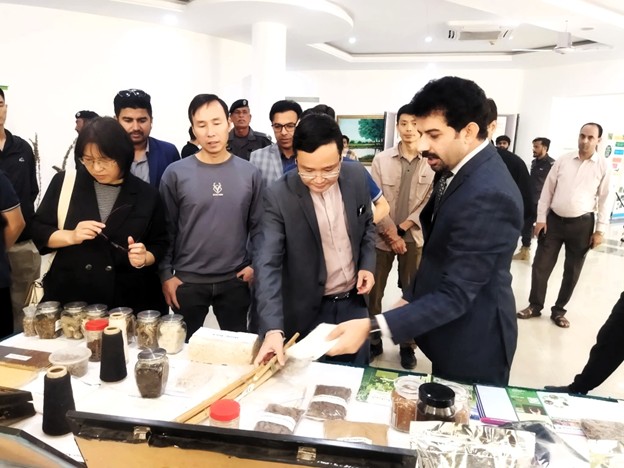FAISALABAD: China pledged on Tuesday to strengthen cooperation with the University of Agriculture Faisalabad (UAF) in agriculture, veterinary sciences, and cultural exchange to build practical partnerships for improving food security and controlling animal diseases.
Zhao Shiren, Consul General of the People’s Republic of China in Lahore, reaffirmed Beijing’s support during a visit to the Confucius Institute (CI) and UAF’s exhibition center, where he held talks with UAF leadership and CI officials.
“China attaches great importance to its collaboration with Pakistan in agricultural education, technology, and cultural exchange. UAF’s progress in agricultural research and food security is impressive,” Zhao said.
Discussions with UAF Vice Chancellor Prof. Dr. Zulfiqar Ali and Local Dean of CI-UAF Dr. Saddam Hussain focused on expanding student and faculty exchanges, launching joint research programs, promoting the Chinese language and culture, and transferring advanced Chinese agricultural technologies to support Pakistan’s farming sector.
Following his “fruitful discussions” with the Chinese Consul General, Dr. Saddam said, “We are committed to transforming this dialogue into tangible outcomes in technology transfer, skill development, and joint research, paving the way for a more prosperous and collaborative future under the frameworks of BRI and CPEC.”
In a related development, Prof. Dr. Mazhar Ayaz, Vice Chancellor of Cholistan University of Veterinary and Animal Sciences (CUVAS), visited CI-UAF and held a meeting with Dr. Saddam Hussain to review the Confucius Institute’s subset at CUVAS and explore enhanced collaboration on animal health.
Addressing the post-flood challenges, both officials agreed “to enhance Pak-China collaboration under the ‘One Health’ framework, with a focus on veterinary sciences and controlling epidemic diseases in animals”, as per an official statement.
“One Health” framework is a multidisciplinary approach that recognizes human, animal and environmental health as interconnected.
The renewed emphasis on veterinary sciences and agricultural collaboration builds on the 2025-2029 China-Pakistan Joint Action Plan, which encourages cooperation in areas such as crop cultivation, animal husbandry, epidemic prevention for plants and animals, aquaculture, agro-processing, agricultural mechanization, and technology training. The plan also promotes agricultural research, expert exchanges, experimental fields, modernization demonstration zones, and capacity building, while continuing landmark initiatives like the training of 1,000 young Pakistani agricultural professionals in China.
These provisions, along with agreements reached during Prime Minister Shehbaz Sharif’s visit to China in September 2025, now provide a strong framework for expanding Pak-China collaboration under the One Health approach, linking human, animal, and environmental health with practical programs in veterinary sciences, food security, and rural development. –Agencies




